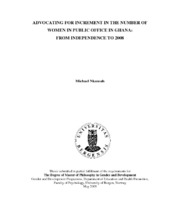Advocating for increment in the number of women in public office in Ghana: from independence to 2008
Master thesis
Permanent lenke
https://hdl.handle.net/1956/3486Utgivelsesdato
2009-05-29Metadata
Vis full innførselSamlinger
- Faculty of Psychology [527]
Sammendrag
The 1950s were a period of great hope and promise for Ghana. Ghana became the first country south of the Sahara to become independent. Though the independence struggle was led by men they were aided by women. Women played a key role in mobilizing people for the struggle at the grassroot level. After independence the efforts of women were not rewarded with appointments to public office. This was rectified in 1965 through an affirmative action. However succeeding Governments since then have not followed up the 1965 affirmative action programme which led to an increment in the number of women in public office despite rhetorics to the contrary. Many women NGOs have therefore answered the call and taken up the challenge to promote more women into public office. These advocacy groups have become important instruments in highlighting the challenges women face in trying to access public positions. Through seminars and other public fora they have called for these challenges to be addressed. In spite of these efforts the number of women in public office in Ghana remains low. It is against this background this study attempts to identify some of the key reasons that have limited the impact of these women's advocacy groups. It tries to answer the question why these groups have not succeeded in convincing succeeding governments to increase the number of women in public office. Based on data collected by using qualitative methodology, this study found that three factors: the cultural environment, the role of the media and the internal dynamics within the advocacy groups, has been contributors to the little impact made by the advocacy groups.
Utgiver
The University of BergenOpphavsrett
Copyright the author. All rights reservedThe author
